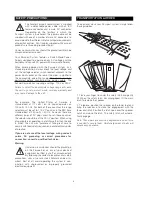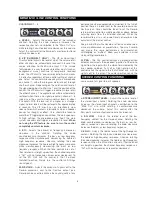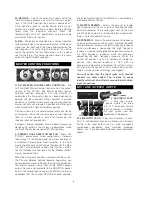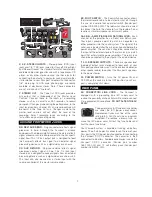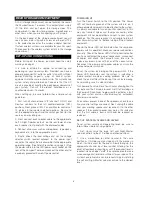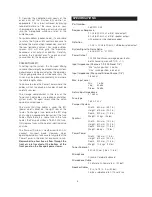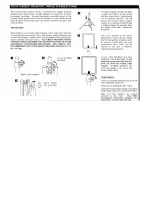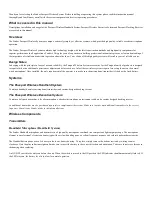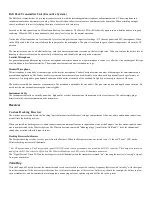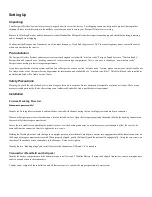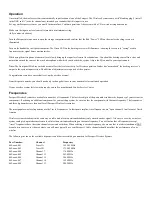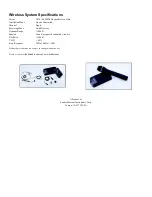
6
M. REV/AUX
– Adjusts the amount of signal sent to the
internal Reverb processor, and to the Rev/Aux output
jack. In the full left position the control is effectively off.
Care should be taken to set the Reverb return master
control to a middle position or above, before adjusting
levels from the individual channels. When the
reverb/auxiliary mix is set, overall levels of reverb can be
adjusted at the master control.
N. BAL
– The balance control features a notched position
indicator and adjusts the perceived “position” of the mono
signal from the input within the stereo field created by the
two speakers. Full Left or Right rotation of this control
sends the signal to the that channel only, with no signal
sent to the other. The center position sends the same
amount of signal to both speakers.
O & P. MASTER VOLUME LEVEL CONTROLS
– The
Left and Right Master Volume Controls adjust the output
volume of the PD-250. The Master controls feature
notched position indicators. For the majority of
applications the Passport system has been balanced to
operate with these controls at their notched 12 o’clock
positions. In situations where more volume is required the
master controls can provide an additional 6 dB of gain
when turned to the right of the center position.
Set the system up in the normal manner and adjust levels
as necessary. Raise the master volume controls beyond
their 12 o’clock positions only after increasing the
individual channel level controls.
Passport’s internal amplifiers have on-board processing
designed to optimize the system’s performance when
used with the custom designed PD-250 speakers.
S. STEREO/ DUAL SELECTOR SWITCH
– Allows the
PD-250’s power amps to be configured as stereo or
“dual-mono”. In the Stereo mode, the system operates as
a traditional stereo power mixer/ amplifier. In the Dual
mode, the channel level controls set the level for the Main
mix (LEFT master volume control). The Rev/Aux controls
set the individual channel levels for the Monitor (RIGHT
master volume control).
When the Dual mode position is selected with the switch,
the Pan and Balance controls become inoperative (you
have selected a mono setting for the output). Additionally,
the internal reverb is only sent to the MAIN speaker
output. Reverb is not available to the MONITOR speaker
output. The reverb level sends for the MAIN mix are also
controlled from the channel REV/AUX channel controls.
The overall reverb level to the MAIN mix is controlled by
the Reverb Master Control.
Q. MASTER REVERB
– Adjusts the amount of reverb
signal level sent to the mix or output. Rotating the knob
clockwise increases the reverb signal sent to the main
mix. When the knob is in its full counterclockwise position,
there is no reverb heard in the mix.
R. SYSTEM EQ
– Adjusts the overall amount of frequency
increase or decrease on the Passport. Rotating the knob
counterclockwise increases the bass frequency response
while simultaneously decreasing the high frequency
response. Likewise, rotating the knob clockwise increases
the high frequency response while simultaneously
decreasing the bass frequency response. When the
system EQ control is set at its notched or straight up
position, the channel response is “flat” with no
frequencies increased or decreased. To set the System
EQ, start with this control in the 12 o’clock (flat) position.
Simply turn the control until things sound good!
You will notice that the input jacks and channel
controls are color coded. This is done to easily
identify which set of controls is associated with which
input connections.
V. MIC INPUT JACK
– Plug your micro-
phone in here. This three
pin XLR balanced female
input connector is intended
for input signals from low
impedance microphones.
W. LINE INPUT JACK
– Plug your instrument in here.
This 1/4 inch balanced input jack suited for use with items
having a line level output such as high impedance
microphones, keyboards, drum machines, outboard
effects, etc. It accepts both balanced and unbalanced
cables.
MASTER CONTROL FUNCTIONS
MIC / LINE / STEREO INPUTS
Summary of Contents for Passport PD-250
Page 8: ......


